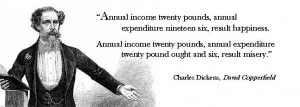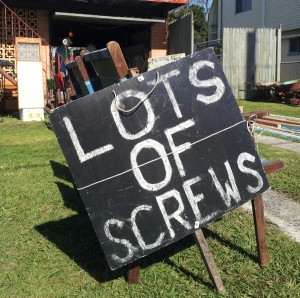 Hoarding is one of those compulsive behaviours that is hard to battle. It makes so much sense when you’re in the grip of it, and this digital age gives hoarders easy access to so much more stuff and to so many more reasons to hoard. Sorry, not reasons – justifications. Our reasons are hidden and lost so much of the time, they’re the last thing we want unearthed.
Hoarding is one of those compulsive behaviours that is hard to battle. It makes so much sense when you’re in the grip of it, and this digital age gives hoarders easy access to so much more stuff and to so many more reasons to hoard. Sorry, not reasons – justifications. Our reasons are hidden and lost so much of the time, they’re the last thing we want unearthed.
Stuff is the most obvious symptom, but it certainly isn’t the only thing. Food is also very common. Books I have previously confessed to also. Bits of string. Obviously. So handy. Photos – another thing made easier to duplicate and hoard in this digital age. Money. Like Scrooge McDuck there’s an urge to pile up coins and notes somewhere safe against a future of doubtful resources. Hmmm but what if something happens to money? Best diversify and hoard precious metals or gems too. And it is now, at this far shore, where the hoarding mind spins into another space and realm. What if those thing are no longer precious? Plush toys, pocketknives, fishing hooks, lenticular placemats of unicorns, all this and more becomes important. Potentially life saving.
I’m lucky. My hoarding is driven by this wildly irrational fear of the future. Others cling more strongly to the past, or are caught in a time-vortex around a particular event. So many flavours to it, and we all wish it were otherwise and can’t imagine any other possible way to face a day.
The future is a fascinating beast. She swirls and morphs moment by moment, drawing everything thing into an unknowable melange that defeats all but the most gifted of divinatory oracles. And so a future arrives, needs unravel and find the hoard … wanting. The hoarder misguessed, mistepped, invested heavily in screws when widgets took precedence. Oh the pitiful tragedy of a hoard unusable.
Here’s a lesson. Nothing stashed is worth anything. TV shows of antiques and rare finds that earn a fortune to the collector are a rarity worth mentioning. Reality is the regret in having to eventually pay someone to take it all away. Unless you use it, for the original purpose you purchased it for, before the mice and mould and age weary it beyond hope or you simply forget you have it. You won’t listen. No hoarder does. You’ll entomb it in plastic and seal it in tubs and catalogue and cross reference the resources. But it doesn’t help.
The future demands nothing of us than the bravery to live in right now. Everything else is a case of hoarder’s regret in the brewing.
Tag Archives: consumption
Gandhi’s storage unit
Recently I came across a picture of the personal items of Mahatma Gandhi that were auctioned in 2009. Many people enjoy the secretive delight of peeping into other people’s lives and handbags, particularly famous and powerful people and Gandhi was both. I wondered what the historians found when they looked into his storage unit.
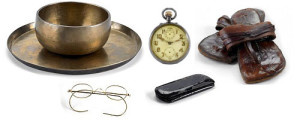
He was an incredibly active and influential leader in Indian politics from 1915 through to the eventual political emancipation of India in the late 1940s. During this turbulent time his leadership was to earn him the endearment of Bapu (Papa). What does a man of this stature, of this importance own? What iconic luxury items might he flaunt to demonstrate his power? What valuable investments would he hold and what unique mementoes and gifts from a grateful population does he display? In short, what can we learn about modern living from Gandhi’s storage unit?
He’d had a long and successful career in law, travelled the world, met with many famous people. He was a well published writer, a political activist and leader, a family man and a philosopher. He was assassinated in 1948 at the age of 78. This was someone still in his peak, still active and publicly involved in the world, not in a hermitage or in any way winding down his life. Should be quite the haul of cool and amazing things!
Live simply so others may simply live
Famously, he owned very few things. The selection in the picture represents nearly half of his worldly stuff upon his death. No need for a storage unit. In fact he nearly wouldn’t have even needed a bag, most of his belongings were his daily wear. That’s his eating bowl there. He owned one book and a little statue (of the Three Monkeys) and actually, that was pretty much it. He replaced those sandals as they wore out, he had the one outfit. It is radically stark. There’s a wallet and reading glasses and a watch, that much most people have on their bedside table.
But then, nothing else. It is confronting.
Not just the lack of books (libraries were a real option in the 20th century) not just the lack of photos (he and his family were already being publicly documented) there’s nothing that to a modern eye says ‘this is who I am”. No music, no brands, no toys or other discernable displays. No sporting goods or dvds or miniature Eiffel Towers. But of course we know very well what type of man he was, what his beliefs were, how powerful his integrity and focus was. I don’t know if he was deliberately proving a point about stuff, but it sure feels like it.
What might our lives be like if we embraced only those things that were necessary to what we do, how we live our purpose in the world? His may be an extreme example – but what if it isn’t? What if we acknowledged how useful it is to share resources for the many (libraries and kitchens and laundries) and keep our personal items humble? Humble stuff in life obviously does not have to mean humble impact.
Let Gandhi have an impact on you, especially if you’ve ever felt frustrated or smothered by your belongings or debt. He lived in a modern, complex world and he did it meaningfully and successfully without a collection of boxed vinyl figurines from a tv series or even sunglasses. There are seven billion people in the world, and there’s not enough room for us all to have a storage unit.
Be happier
Why do we put off having a good time? Sure, technically, celebrating is normally reserved for a ‘significant event’ but that shouldn’t put the dampeners on enjoying our day-to-day living more.
That’s what we all want, right, to be happier?
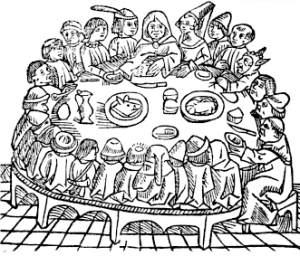 Don’t wait to celebrate. It is a long way between birthdays and promotions through the year, those special events often slip by us anyway. Birthdays are particularly fraught with baggage in our culture where youth is venerated. What can we do to be happier in our lives? Time is ticking people, this is our life we’re talking about!
Don’t wait to celebrate. It is a long way between birthdays and promotions through the year, those special events often slip by us anyway. Birthdays are particularly fraught with baggage in our culture where youth is venerated. What can we do to be happier in our lives? Time is ticking people, this is our life we’re talking about!
What stops us being happier?
We worry – but by definition worry is about things that haven’t happened yet. So we’re making ourselves less happy now to think about things that may not happen in the future.
We turn worry into anxiety. While worry is tiring, anxiety is crippling. It isolates us from support and undermines our confidence.
The world is noisy. There is an avalanche of data every day, we’re suffocating under information and opinions.
Lots of people are mean and selfish. Let’s not go into this one too deeply, but I bet you thought of an example immediately didn’t you? Probably from the last day or so. We live in a crowded and pushy world, where a lot of people are out to get what they can.
Never enough money to go around. Do you get to the end of your pay and still have some week left? Do you wonder where the last pay went to?
We don’t have time. So very busy all the time with doing things and buying things and planning things and worrying. Oh my. So much to do! Where does the time go!? Another month and still you haven’t gotten around to that important thing you wanted to start? Drive faster, work harder, try harder to squeeze it all in. ARGHHH!
We just don’t think of it. It is a bit of a rut, day to day, doing all the things you have to do. Plodding through work and chores and bills and buying groceries and getting that thing fixed and all the other details. Being happy just kindof slips out of the picture.
Seven things you can do this week to be happier
Live in the now. Take life a bit more ‘as it comes’, or as a wise friend used to say “one meal at a time”. Of course you have big-picture plans and a few things you really want to achieve, but let go of obsessing over the illusion of control. Roll a little as the waves of life come at you.
Count your blessings. Make a list of all the things you’re grateful for. It is the best ever antidote for other people being nasty. Why? Because it brings you back into a core space that is ok, a space from which you can worry less about other people being grabby, because you realise you probably already have enough. Want a challenge, send a postcard or a letter to someone and thank them for being in your life or for something particularly that they did.
Buy less stuff. Being happy is an experience, evaluate how you spend your money in terms of what you value.
Turn off the worry switch. Anxiety is a horrible outcome from a quirk of our clever brains. The capacity to think through events that had not yet happened gave early humanoids a survival advantage. These days it keeps the wheels of our minds spinning when we need to be sleeping. Not so helpful. Learn about sleep hygiene and mindfulness practices that suit your variety of worry. If you can’t act on your concern, mentally count numbers. Or do maths. Really.
Be in a bubble. Cut out some (or all media) and detach from the ‘stay informed’ imperative. You need some of that intellectual energy to deal with your own life, to solve problems (see ‘worry’, above) or to create and heal. You won’t miss much. If you feel like a challenge, learn how to meditate and give that a go. You’ll get the secret bonus that meditators know all about (true quiet).
Time travel. Pretend you already lived today and then time travel back to the morning and tell yourself what the one important thing to do is. Just do that. No matter what other random, confusing, urgent and distracting things happen, hold onto the knowledge that future you needs current you to just do the one thing. You’ll change the nature of your time. Trust me, I’m a Doctor.
Share a meal. No need for a special occasion or fancy food. Just enjoy an ordinary meal in company. Chat about your hopes. Listen. Relax and enjoy the taste of the food, feel grateful for the earth that grew it and the people who worked to bring it to your plate. Tell jokes, daggy ones you remember from when you were a kid.
There you go.
None of this is too complex to grasp and you don’t need to hire a professional to do the paperwork to get started. Don’t like this list? No problem, here are 10 scientifically proven paths to be happier and Dr G will point you to any number of similar lists.
The real trick? Just make one of them happen. Now’s your moment, act on a whim so you don’t over-think it.
This week, don’t wait to celebrate. Make the call and put an idea into action. You’ll be happier for it.
Worry knot
Back in July we first talked about provisional living and making choices. At that time those concepts lead into a long talk about consumption and debt.
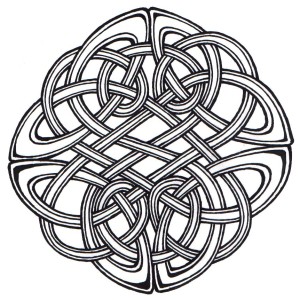 Let’s spiral back to our beginning for a pass at the topic from a different angle.
Let’s spiral back to our beginning for a pass at the topic from a different angle.
There’s another powerful way that provisional living and avoiding choices haunt us and that is through worry.
Worry is an old word originally meaning ‘to strangle’ but those edges are now softened by time and use. We modern types resonate with the sharper ‘anxiety’ (maybe we prefer the strong sounding Latin root). Worry strangles my day when it appears because it has a ravenous appetite for eating up my confidence, contentment and ability to make a decision. Maybe you have felt that.
Have you agonised over a decision, well beyond the rational weight or need of the implications? You probably have spent time chasing down all of the possible consequences of each permutation of action and attempted to double and triple guess what it most likely and how best to juggle the outcomes and payoffs. It can go so long you lose momentum to actually make the step, or the opportunity passes you by. Worse still, you can finally come to realise your health is suffering, you’ve become worried sick.
You’re not alone. Anxiety disorders are the most common mental illnesses in Australia and both the U.S. and the UK (I stopped looking after that, it was too depressing). That’s a lot of people with a knot in their guts over things that are on their mind.
Some of the things that connect our worry to the earlier discussions is to do with the addiction we have to comparisonitis. We lose touch with enough and drift into judging our situation against what we perceive others to have or to be. This outward focus of our energy and attention is draining, it blocks empathy and kindness (to ourselves as well as to others) and it is guaranteed to help us lose our way.
In worry we get lost in a maze. In comparing ourselves to others, we let go of our own thread and our path and step into a wilderness of subjective judgments based on guesses and hearsay. We do not know what is really going on for anyone else. We can’t know what battles they’re facing, what burdens they carry or what pain they’re hiding. It is too easy with social media to compare your own inner turmoil with the show reel other people promote.
When worry starts to get you into a knot, be kind to yourself and bring your attention back to your own reality. That’s not as easy as it sounds, but there are techniques that are easy to learn. Interestingly enough some of them correspond to spiritual practices and we’ll explore that terrain in the new year.
In the meantime, if you’re in Australia and you would like some help with your worries, call Lifeline on 13 11 14 or Beyond Blue on 1300 22 4636.
How can I help?
Suggestions are welcome for blog topics for 2015. Comment here or email me directly.
Good housekeeping
We’re caretakers here. We get to enjoy our time and we leave everything behind when it is time to go.
Every human child from today onward that will ever be born, will be born right here on this single planet, Earth. What they will have for their lives and their children, is partly up to us, from what we build, and partly from what we consume that can never be replenished.
What should they expect from us?
Do good housekeepers use everything until it breaks? Is it really ok that we allow our leaders to exist on a three-year re-election cycle that doesn’t respond well to polling on any issue where short term extravagance needed to be weighed against long term (generational).
You get to make a choice on how much you care about what kind of an ecosphere we’re bequeathing to future generations. It is one of the core aspects of what sustainability actually means (remember that the next time you hear a public figure using the word and you’ll immediately be able to fine-tune your bullshit meter) and also one of the basic skills (delaying gratification) needed in order to mature into adulthood.
So what’s in it for you?
Great question.
Answer: Nothing.
No gold star, no pat on the head, no special tax breaks. Nothing.
This is part of our duty if we want to be citizens of this world. The world, and our species, stretch in time both behind us and ahead of us. We are part of a bigger body of life. All the future of our species (and many others who live here too) are asking of those of us alive right now, is that we keep good house. Don’t trash the place, be considerate of the neighbours, enjoy what we can while leaving plenty for others to share. Any reasonable person would consider it common sense.
Our duty exists whether or not there is a brighter future in it for us personally. We may or may not accept it or like it, but that’s how it is. We can stay as children and wait for someone else to clean up for us, or put our shoulders into the task ourselves. Take a breath or two before you react to that idea. Human life isn’t all about progress and sharing doesn’t mean going without completely.
Later on we’ll get into more of what sustainability might mean day to day, but for right now, while we’re thinking about the values and meaningful lives we yearn for, it is timely to remember that liberty is always bonded to responsibility.
Someone who had a very concrete experience of freedom was Victor Frankl. If you’ve not yet read his famous book (Man’s search for meaning) please consider doing so (it is both short and non-academic). Despite the situation it discusses, I can almost guarantee that it will make you feel more positive and think about life’s challenges with a deeper sense of personal resilience. let’s give him the last word today.
Freedom is in danger of degenerating into mere arbitrariness unless it is lived in terms of responsibleness. That is why I recommend that the Statue of Liberty on the East Coast be supplemented by a Statue of Responsibility on the West Coast.
Tears’ fragile path to freedom
There’s a common assumption that freedom equals happiness in a simplified “we all lived happily ever after” kindof way. Just in case you’re not sure, that is a fantasy. It is of very little use to any of us.
 Our yearning for freedom has us seeking all of the elements that might contribute to the alchemy we know as contentment (often confused with the showy cousin “happiness”) but there’s a glitch in the mix and we need to address it.
Our yearning for freedom has us seeking all of the elements that might contribute to the alchemy we know as contentment (often confused with the showy cousin “happiness”) but there’s a glitch in the mix and we need to address it.
If freedom did equal happiness, being sad or upset would exclude anyone from the possibility of freedom. We often try and cover over sadness quickly, move on from it, deny it. It is too awkward to dwell on and, of course, it is painful but it is part of being human, it is part of a full life. Lately we’ve lost track of that a little bit by venerating the heroic outsider.
Our culture has confused the idea of individualism with the physical reality of us as individuals. It is a sad and recent development. (This could quickly easily be perceived as a political argument as these terms are used in political contexts but that is not the intent here. If you look up the political elements, or want to follow these other tangents, please feel welcome to do so. We’ll still be here when you come back.)
Basically for most of us, this has lead to a fundamental loss of feeling that we belong. However there is something we’ve all experienced that can lead us back into connection and that is our tears.
Life is not all glowing unicorns pooping rainbow cupcakes of joy and cash. Bad shit happens.
People you love get horribly sick, people you don’t know drive into you, your body isn’t perfect, we age, we suffer. It is a lot to bear and sometimes we cry. It can feel like we cry a river of tears.
There’s nothing to say in the moment that will take that gut wrenching away. That pain is real. It is what it is. It really does hurt. And yes probably most of what caused it is unfair in some way, and our egos want to shout that out and shut down that pain.
Underneath that, after the rawness, there’s an opportunity for something else. Those hot tears and the salt of our body have forced themselves from our body to honour the depth and meaning of the connection with the people in the situation, that situation that you were so deeply part of that you felt that pain. If we were disengaged, we wouldn’t feel that pain. If we didn’t belong there, it would be so much harder to feel even empathy. The connection existed and so the pain that exploded within you is because of that connection.
It is such a valuable clue. We are so much more than just one-dimensional figures on spreadsheets. In the face of an onslaught of advertising working tirelessly to push us into purchasing things we don’t need to assuage fears we didn’t have, in the face of that and inside ourselves we know these truths. That love is real, that when you love you can be hurt.
Our sorrows are personal but lament connects us to the human condition, reminds us of the love and respect that we have for others and that they have for us. We belong in enmeshed relationships with responsibilities and expectations of trust and value.
It sounds unlikely, but tears make a fragile path to a powerful place. They signify our internal eternal freedom, they reflect our ability to hold true to our love and our values. It is inside of love and our own values that we find our own anchors to freedom.
Do you want better?
Thanks for sticking with the debt thing for the last few weeks. It is worth talking about because it links so closely into our faith that there’s a brighter future around the corner. That faith is insidious and it is only by using specific examples that we can understand how it is woven throughout our lives. Eventually we can identify it turning up and make an informed decision about whether to believe it or not. At least you’d know what flag you’re rallying under. That’s important because your expectations and resiliency come from your sense of your own ability to respond to the world.
Here’s an example. There’s an advertisement that’s come out recently. It is impeccably conceived and beautifully executed. This is how it goes.
“Everybody wants better. Everybody. It’s a given. Bigger. Brighter. Faster. Safer. Smarter. Better in a whole lot of ways.” <credit>
Ah, rousing isn’t it!? The advertising creative types have framed it cleverly. “Everybody wants better.” You can’t really argue with that. That’s why people emigrate to far away ands and learn another language. What reasonable person wouldn’t *want* *better*. Wants are like distractions – endless – and ‘better’ is obviously an improvement on whatever it is you’re currently making-do with.
Sometimes making things better is just darn practical.
A bridge across a river is better than a ferry – but wait – compared to what? If you’re trying to deliver on a deadline, yes it is better, but if you’re an artist wanting a lingering inspirational journey, you’re probably going to want the ferry.
Hand written copy of a document anybody? Wow, it can be beautiful, but gee it takes a long time and at the end you only have the one copy. If you want an artwork it is a great idea but if you want to reach the masses or at least 5 friends, probably a printing press is better.
Most of the decisions we’re making today in our lives are more nuanced than those practical examples. The first world makes so much fast and easy that we have very few practical needs unmet. For the economy to continue to grow, wants must be made stronger and stronger.
‘Better’ is an open word, waiting for you the reader (or listener) to put in the comparison. In an ad it basically can’t fail. ‘Want better’ is a double-subjective that creates a vacuum so powerful it can immediately suck any of your attention and then available disposable income into the vortex of that need that it just created.
Look again at the phrase, it is code too for “What you have is not enough and there’s a lot more that you’re missing out on.” It is kinda wasted on the product that paid for the ad. That agency should have bundled a whole bunch of mid-sized aspirational wanna-be products and sold them shares in this campaign. But I digress.
So yes, everybody does want better, it *is* a given. This is a chance to make a choice about what you’re going to compare things to. Do you want better from our governments for the generations not yet born? Do you want better for the billions of people who live without running water or hope of a secure food supply? For whom do you want better and against that what decision will you make next time you see an ad for a new smartphone?
We move through scenarios all the time and our bias is for optimistic outcomes, but there is not necessarily a brighter future around the corner for all of us. How you make decisions is becoming a lot more important than the decisions you make because the future really is an unknown country.
Debt grief
Did you hope we were done with the melancholy subject of debt?
Not yet.
Something came up from the readings that was unexpected and bears airing. People have a lot of hidden grief about their debt. It is out of sight, but not out of mind and weighs heavy on hearts.
All that material abundance has come at a greater price than we were told at the checkout when we punched in our PIN.
There are the obvious initial thoughts when buyer’s remorse kicks in or we get home and find there’s simply no where left to put something new. Deeper than that we think of the days of sunshine lost to our grey cubicles and fluorescent lights. We know that the youth of our hearts and the blushes of love are drained by uniforms and timetables and the indignities and compromises that come with not feeling free to walk away from a job. Perhaps you have figured out how much your modest mortgage will cost over the course of your loan and what each of those dollars will cost you in time in your cubicle or uniform. It is beyond sobering, it is a painful and softly brutalising moment.
There are many articles and blogs addressing how the five stages of grief relate directly to debt and I encourage you to get some support for where you are up to with yours because it is hard to see your way forward while you’re stuck in sorrow.
Ram Dass in his recent post on grief spoke about finding some solace in realising that “we only grieve for what we love” and in that moment there was a terrible clashing noise for me. None of us believes we love money, but in our culture, where we treat wealth in the form of money as the portal to fulfilment, the portal to all the things we do love to indulge in, debt does brings with it a trailing veil of grief. We must feed the screaming baby at the expense of current or future desires. Fear of missing out, yes, and the harsh reality that the money is not coming back, and worse, needs more money yet. We are not done working for someone else. Working to their timetable and to no foreseeable end.
How can we be released from this cycle?
Is it even possible?
Do we have the power to release ourselves?
Yes, we do have that power. As with all swords it comes with two edges so you’ll need to be sure you can handle it if you want to pick it up. Next week we’ll explore those edges.
Image source and © information: “Serpiente alquimica” by anonymous ; uploader Carlos adanero – This work is in the public domain in the United States, and those countries with a copyright term of life of the author plus 100 years or less.This file has been identified as being free of known restrictions under copyright law, including all related and neighboring rights.. Licensed under Public domain via Wikimedia Commons.
Financial balance
Maybe you don’t see the debt you have as a problem that needs fixing. After all, it is pretty normal to have some and probably you’ve reached an agreement with yourself about what’s ok to live with. The suggestion to live within your means is patronising and overly simplistic. I get that. Maybe you really are happy with constantly feeling the compulsion to get new stuff and shoving the old stuff to the back of the closet. Maybe you think that if you need to, you could take a load of barely used clothes and accessories to a store and get some cash back by selling them. Good luck to you.
If you haven’t tried to sell your stuff, especially if you think you could, and have even found yourself referring to it as “a type of asset” then I suggest you try. See what you can get for a hardcover book that you bought new for $45 just a year ago. See what your designer jacket is worth on the second hand clothing market. Take just one of those unused sporting items down to the pawnshop and see what they’ll offer you. I challenge you to swallow your pride and accept whatever you’re offered, if they’ll take it at all. Now ponder how much it cost to fill all those busting cupboards. If you’re using that stuff, fantastic, we’re talking about what is essentially clutter. You don’t use it, maybe you don’t even remember buying it. The point is, you’re still paying for it, and you’re paying to keep it.
You just don’t know what the future is going to bring. I know you’re likely to feel positive about it, to be optimistic that probably whatever’s coming is good news. I hope so. What if it’s not? Sure, most of the time nothing much changes. Every now and then something big happens to one of us personally, or to a friend. When it comes down, everyone involved goes right into reaction mode. When it happens, it all seems to happen fast. The rest of your life gets put on hold and you deal with it. Emotionally it can be hard to keep it together. Financially it can be a tsunami of bills and expenses and you need to be able to move through all of that and keep it together to go to work, or look after someone, or call in the attack lawyers or translate from the medical specialists. Whatever the flavour of the situation what you do not need is to be green with worry about where the money will come from.
That’s an extreme example. Personal catastrophes are not common, but they do happen and a financial cushion of some kind can really help. In our interconnected global economy, there are many ways in which a twitchy butterfly somewhere you’ve never heard of can result a few weeks later in difficulties or hardship for you and the ones you love. If you have debt, you’ll find it harder to respond and recover from anything that blindsides you.
Of course it is hard to jump from debt to not debt. It is very much worth doing, although it is a challenging project in itself because you have to learn to balance two moving targets in an unpredictable environment. Like a dog standing on a ball and balancing another ball on your nose, you are going to need some specialist training and some good motivational treats.
Before you’re ready to perform you might be best placed to face up to the quirks and habits that got you where you are today. For all the rationalising about it, mostly why you’re in debt is likely to be due to some unconscious behaviours (I’m not talking about people looking up and aspiring to the poverty line, or in hardship due to extreme or ongoing, systemic poverty. If this is you, please contact a reputable charity and get some help and support in dealing with your situation. I’m talking to everyone else except probably Lady Gaga, Gina Rinehart and Rupert Murdoch).
You can’t see for yourself the patterns you’re in, or you’d change them. Who knows you well enough to tell you the truth without making a big deal about it (or it just being massively awkward)? Your subconscious is your best friend here. It really knows what’s going on when you don’t remember why you had to buy another pair of shoes almost identical to a pair you’ve never worn, or spend your week’s wage on a night out. I’m not normally someone who promotes a binary world view, but in this instance, it works well for the predicament we’re faced with. Income and expenditure, they need to be balanced in your life.
Think about it. You know about budgets, compound interest, and all those things, but you still do it. You’ve been cranky at yourself and sworn you’ll change, and you haven’t. You need to break the cycle. Imagine you had the information to stop your self-sabotage. You need to clear away some of the shadows you have around money so you can use your energy to gain balance and take control over your situation. Dance in balance with the available resources and your perceived needs
(Woo Woo Warning)
I use a very simple tool to ask my subconscious things that I feel ready to know (and you should really be ready because it never lies. It doesn’t tell even little white lies.) Your subconscious is always delighted to be invited to start a conversation with you, but it is not tame. You may not like what it says and some things it throws at you will be confronting.
There are lots of tools, but I like tarot cards because they represent archetypes I understand. There are 20 major life moments in pictures and 4 lots of simple, everyday experiences grouped by the themes of emotion, willpower, money and thoughts. That is the most simplified and basic description I could come up with in 25 words or less. It leaves a fair bit out as you might expect, but it is enough for what we’re want to achieve at the moment.
Well I’ve made a tarot spread, especially designed for this topic and it is available on my freebies page.
I haven’t had time to do a sample reading to illustrate this layout, so if you don’t have your own cards and you are keen to find out if this is helpful, I have a special offer. Let me know either in the comments or by email that you want a free reading and I will do a one for you (this offer is for the first three people who respond or until Monday 8th September 2014 whichever comes first) on the proviso that if I change any identifying details I may use your reading as an example. I will need you to tell me about your situation in order to do this, so please don’t ask if you’re all like “you’re the psychic, you tell me” because I am not a psychic, that’s not the kind of exercise we’re in here.
So, Income and expenditure. Face into the sun and the shadow falls behind you.
(Image © Erin Morgenstern from the unpublished Phantomwise Tarot)
Desire’s dark side
Lustful affairs bring consequences. The lovechild of the compulsion to consume is the unwanted bastard offspring Debt.
Oh Debt. We are not shy about conceiving you.
Australians lead the world with an average household debt (which includes mortgages) footprint of 1.8 – this means that people are spending nearly twice what they earn. All of their income and 80% of a whole ‘nother wage. Staggering. (ref ABS Data May 2014 ) No really.
‘Yeah’ you say ‘but that’s including houses and everybody knows that the Australian housing market is overvalued. That’s why I rent!’ Ok fine.
Australians owe billions on credit cards, about $4 400 per person.
Just for fun, this clock (ASIC Moneysmart ) shows how much Australians currently owe on the plastic. Your factoid for today is that 49% of those who carry $5,000 or more in credit card debt have a degree or a diploma. Oh wait, last one! Two in five people have no idea what interest rate they are paying on their card (and that was in March 2013! ).
Much as those figures stimulate the curiosity and sound all newsy they actually distract from the human story that sits behind them. It is all too easy to evaluate yourself immediately against those figures so you can dismiss them. Relief – ‘mine’s lower!’ Or to judge – ‘how could they let it get to that?!’ I chose to include them because they’re real. Most Australians of age have one or more credit cards. They owe money on them that potentially they will never ever actually pay out. Or like dieters who know better, they yo-yo in and out of debt on the cards in tides of recrimination and stoic, forced budgets.
None of us is alone with our debt baby. We live in culture where it is normal to carry debt. That’s what we call it, not ‘tortured by’ or ‘enslaved by’ an endless burden. No, we just casually ‘carry’ it. We consider it part of the ‘cost of living’. Everyone does it. Those who do not have a credit card have an uneasy aura of either a do-gooder or a bankrupt (depending a bit on the tone of voice used to convey the information) but are a bit creepy either way. Not someone you’re going to listen to anyway.
Would you listen to yourself though? If your future self could tunnel through the time vortex and whisper in your ear, what would they say to you about how you left them holding the crying, hungry baby? Can the future you remember the emergency purchase or convenience of takeaway dinner or the money you saved by buying on sale with credit? Did you ever fall in love with a book that you simply must have only to get it home and put it on top of the pile of other books you haven’t yet read? I did. Many times.
When ANZ handed my debt over to a hard-nosed collection agency and I had to own up to my past indiscretions there was no way I could remember a single thing that had been so important it had to be bought with that card. My past self had blithely given me a big stinking problem to deal with and I hated her for it. If that’s not a perfect example of provisional living going bad, I don’t know what is. I don’t know that I would have listened to future me though, if I had tried to deny those lustful urges. In the end, it was an affair that took me years to recover from.
Why do we assume that our future selves will somehow have more resources, more ability to deal with the consequences of our actions? Because we’ve inadvertently subscribed to the doctrine of progress. We do it in our personal lives, we do it in our communities when we build houses on every next block of land, leaving no space for anything else. We do it as a nation when we use every bit of energy we can grab because ‘they will figure out a new technology soon and we’ll all have limitless lives and won’t have to work’ or something that sounds like winning the ‘infinite planet lotto’. Not going to happen. Addictive and easy, sure, but not real.
The reality is that it is impossible to be free when we are in the thrall of endless compound interest on debt. In the next quiet moment you have to yourself, ask your future self what it is that you both want most out of life.
It is not going to be more debt.
Kiss your loved ones and plan a different way forward. We’ve got a lot ahead of us.




